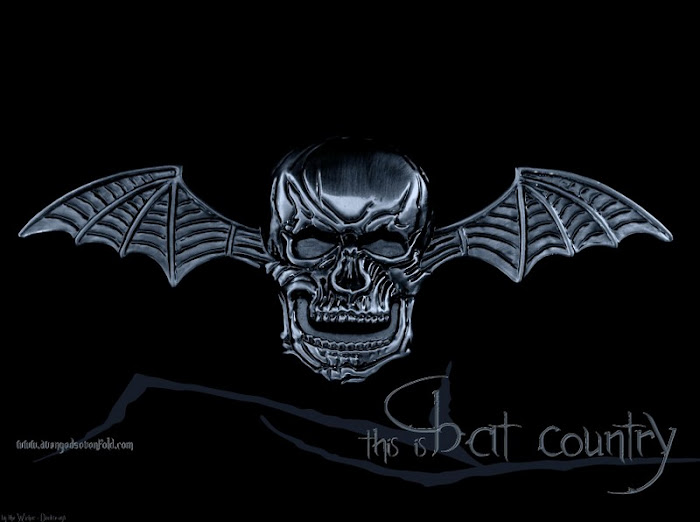
As musicians, the members of Avenged Sevenfold are definite virtuosos in a time when being accomplished artists seemingly means so little. They are inquisitive and never fully satisfied with their own work. They seek to grow and improve every day, regardless of the obstacles or costs involved.
They are a rock band. They are rock stars. They are Avenged Sevenfold.
Avenged Sevenfold, the album, is a self-produced effort. While the band shared co-production credit on 2005’s million-selling City Of Evil with Mudrock, this new album is solely their responsibility — and they’re primed to accept it.
But attaining such stature didn’t arrive in an overnight jaunt. To the contrary, Avenged Sevenfold had been an integral part of the independent, underground rock scene years before breaking through on commercial radio. In fact, the Orange County, California-based act launched its career several years ago (they were barely out of high school) with the release of its debut in July 2001 of Sounding The Seventh Trumpet.
Miles of van touring ensued, performing in tightly packed clubs, and sweating shoulder-to-shoulder on both national and international levels. Despite the truly D.I.Y. affair (which still found the fledgling act putting on an eye-opening, elaborate stage show), Avenged Sevenfold never offered anything less than a full-throttle set. The band released its second independent full-length in August 2003, Waking The Fallen, a couple years later, greatly expanding on its metal-based foundation and giving us a not-so-subtle nudge that something exciting was in the imminent forecast.
Our suspicions were confirmed a couple years later, with Avenged Sevenfold’s breakthrough 2005 Warner Bros. debut, City Of Evil, featuring the wildly popular single “Bat Country.” That was the turning point for the fearless, genre-bending quintet that, after years of clocking in on the independent level, had finally advanced towards a milestone they had been seeking throughout their careers.
A7X wrapped 18 months of relentless touring in October 2006 and immediately began writing Avenged Sevenfold. After the success of City Of Evil — where they proved they had truly captured the imagination of music fans of all shapes and sizes — they became the only band to headline Warped Tour and Ozzfest while simultaneously hitting Number One on MTV’s TRL. The natural question was whether the band would continue its creative odyssey or return to the formula that brought them such success on the last go-around. Thankfully, they continued their musical exploration without caving in to any outside influences.
For this self-titled release, the act returned to the garage at M. Shadows’ parents’ home where these high-school friends had penned every other song in their discography. The band sought to delve into genres and recording techniques they had discovered on the road. For instance, they wanted to incorporate the narrative lyrics and biting guitar tones they’d admired in country music, as well as the powerful bottom end of hip-hop they felt would only add to the power of their music and message.
“All those months on the bus we really weren’t finding new rock that was moving us,” says frontman M. Shadows. “Instead, we were listening to everything from Toby Keith to T.I., and finding elements we could incorporate into what we were doing to make our next record more interesting to us.”
In the studio, Avenged Sevenfold enlisted engineers Fred Archambault and Dave Schiffman (System Of A Down, Johnny Cash, Red Hot Chili Peppers), and the team went to work.
The resulting sound and rhythm of Avenged Sevenfold is, in a word, eclectic. Yet it’s still trademark A7X. “‘Scream’ has a groove we really wanted to inject into this record,” says guitarist Synyster Gates. “And on ‘Lost,’ you can hear the influence melodic bands like NOFX have always had on our band.”
A7X composed the string sections, including the individual instrument orchestration, with the assistance of Marc Mann and Steve Bartek from Oingo Boingo (and who currently orchestrate for Danny Elfman). With the soaring strings in “Afterlife,” the haunting and theatrical performance of “A Little Piece Of Heaven,” or the gentle vocals of a child in “Unbound,” the band’s creative and varied approach is surprising. Percussionist Lenny Castro brought a dynamic to “Brompton Cocktail,” and noted pedal steel and banjo player Greg Leisz added a country flair to the song “Dear God.” Yet as Gates adds, “it’s the dueling guitars, Shadows’ voice and the Rev’s brutality that make every one of the songs sound like Avenged Sevenfold.”
Lyrically, Shadows was striving for something more personal on the new album. “I feel we all experience a certain inner conflict, the push and pull between how we think we should act, or want to act, and the temptations and human instincts that we often blame when we don’t end up being the person we want to be.”
In fact, the album’s first single, “Almost Easy,” focuses on more similar temptations. “Afterlife” addresses the notion of “memento mori,” or the need to remember that death may intervene before we have reconciled differences with friends or loved ones.
These guys worked their asses off making Avenged Sevenfold (enlisting studio legend Andy Wallace to mix the record), literally sweating every detail with the same (if not stronger) conviction they had years earlier in trying to prove themselves to the masses. But it’s best you understand what was really going on during the three months these five best friends were holed up making Avenged Sevenfold.
They were having the time of their lives.
